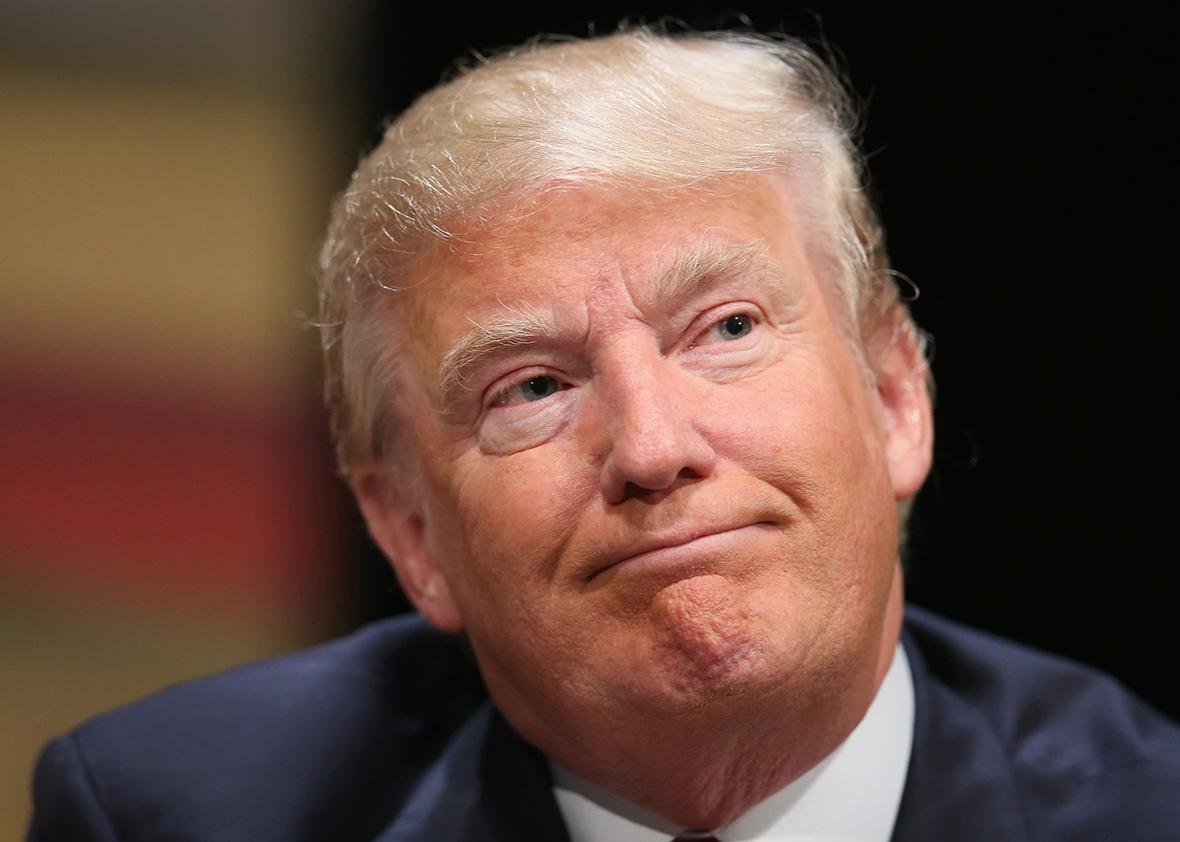On Saturday, during a Republican presidential forum in Iowa, candidate Donald Trump questioned the heroic bona fides of former nominee and Arizona Sen. John McCain, a naval aviator who spent five years in a North Vietnamese prison camp. “He’s not a war hero,” said Trump, whose own service record includes a poorly explained medical deferment during Vietnam, “He’s a war hero because he was captured. I like people who weren’t captured.”
Almost immediately, Republicans condemned his rhetoric as offensive and beyond the pale. “Donald Trump owes every American veteran and in particular John McCain an apology,” said former Texas Gov. Rick Perry, upon taking the stage at the event. “I unequivocally denounce him,” said Scott Walker while campaigning in Iowa. Jeb Bush called the remark “slanderous,” and in a statement on Saturday, a spokesman for the Republican National Committee said that: “Senator McCain is an American hero because he served his country and sacrificed more than most can imagine. Period. There is no place in our party or our country for comments that disparage those who have served honorably.”
One thing that stands out in the response is the odd partisanship around military service. In 2004, for instance, there was a place in the Republican Party for comments that disparage those who served honorably. Many Republican leaders and officials, like then–Florida Gov. Jeb Bush, supported the “Swift Boat” attacks against John Kerry’s war record. (McCain was a notable exception at the time).
More significantly, there’s the fact that this was the tipping point for anti-Trump Republicans, and not his aggressive xenophobia. For the past month, Trump has used racist invective and know-nothing nativism to build a platform in the Republican presidential primary. Like the most famous provocateurs of the Obama era—from Sarah Palin and Glenn Beck to Rush Limbaugh and Dinesh D’Souza—he’s indulged the worst, most paranoid parts of the Republican base, feeding the fear and anxiety unleashed by economic insecurity and rapid social change.
The whole time, mainstream Republicans were silent. The same figures who pounced on their opponents for slight missteps were unwilling to denounce Trump for his racism. Up until his attack on McCain, the collective Republican Party response to Donald Trump was somewhere between silence and qualified defense; at Politico Magazine, for example, National Review editor Rich Lowry wrote that Trump “had a point” when he said Mexico isn’t “sending their best,” ignoring Trump’s claim that those immigrants are violent criminals.
But now, Republicans are criticizing Trump and for most observers, this means the beginning of the end for his stunt campaign. “The Trump portion of the 2016 race may be long remembered, though like the birther saga of the last cycle, there will be little of use to reflect upon,” writes Rick Klein of ABC News. “In any event, it’s winding down now, or so it would appear, in predictable if not quite painless fashion.”
But as much as this seems true, I think it’s premature, even after Trump doxed fellow GOP candidate and close McCain friend Lindsey Graham on Tuesday. At this point, there’s no hard evidence that pro-Trump Republicans have left his stable. While there’s still time for an anti-Trump backlash, the present fact is that he was more popular than ever when he attacked McCain. According to a new poll from ABC News and the Washington Post, Trump was the favorite for 24 percent of registered Republicans and Republican-leaning independents, the largest lead of any GOP candidate this year.
There are caveats: It was a weekend poll, and we don’t have a full response to the McCain remarks. Also, his support dropped over the course of the survey. And there’s the broader point that Trump’s surge is as much about media attention as it is about his campaign or his rhetoric.
At the same time, Trump isn’t a meaningless sideshow that will disappear after a few offensive remarks. “He has exposed and exploited the Republican Party’s two great weaknesses,” writes Ryan Lizza for the New Yorker, “the fact that many of its voters don’t agree with Party leaders on immigration and the fact that the Party is powerless to do much about it.”
I’ll add something else: For the past eight years, an ecosystem of pundits, politicians, and provocateurs has spun a web of conspiracies about the president. Barack Obama wasn’t a mainstream politician from the center-left of American politics, he was a “Marxist” consumed by “anti-colonial ideology,” an “Alinskyite radical” who would confiscate guns and send opponents to re-education camps.
Trump does more than come out of this fever swamp; he’s a conduit for its views, and evidence that it’s more than a fringe—it’s a substantial portion of the GOP electorate. It’s why Texas Sen. Ted Cruz won’t denounce Trump like his colleagues. “You know I recognize that folks in the press love to see Republican-on-Republican violence, and so you want me to say something bad about Donald Trump, or bad about John McCain or bad about anyone else,” he said. “I’m not going to do it.” If and when Trump leaves the field—and, as a vanity candidate, he will eventually—Cruz can win his voters.
As for Trump’s trajectory after his McCain remarks, this would be the beginning of the end if the backlash were universal, but it isn’t. On Monday morning, Fox News’ Fox & Friends defended Trump, and later that day, notes the New York Times, Rush Limbaugh rallied his listeners to Trump’s defense. “Trump can survive this, Trump is surviving this,” he said. “The American people haven’t seen something like this in a long time. … They have not seen an embattled public figure stand up for himself, double down and tell everybody to go to hell.”
As long as conservative media defend him, there’s a decent chance Trump can survive, especially given that so many conservative voters distrust their leaders. If Trump stays in, then we—the public—can see what happens when a political party meets—and can’t beat—an agent of chaos.
